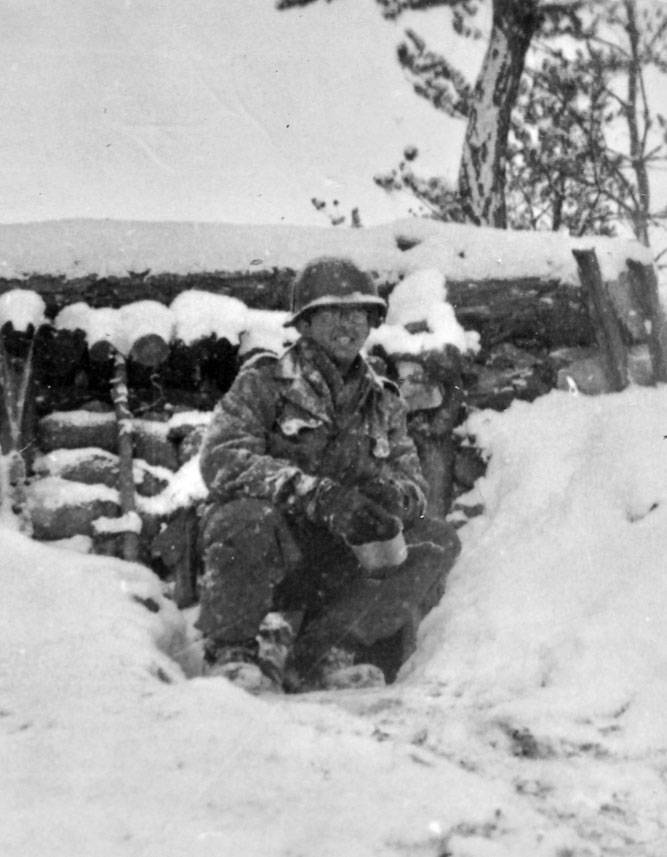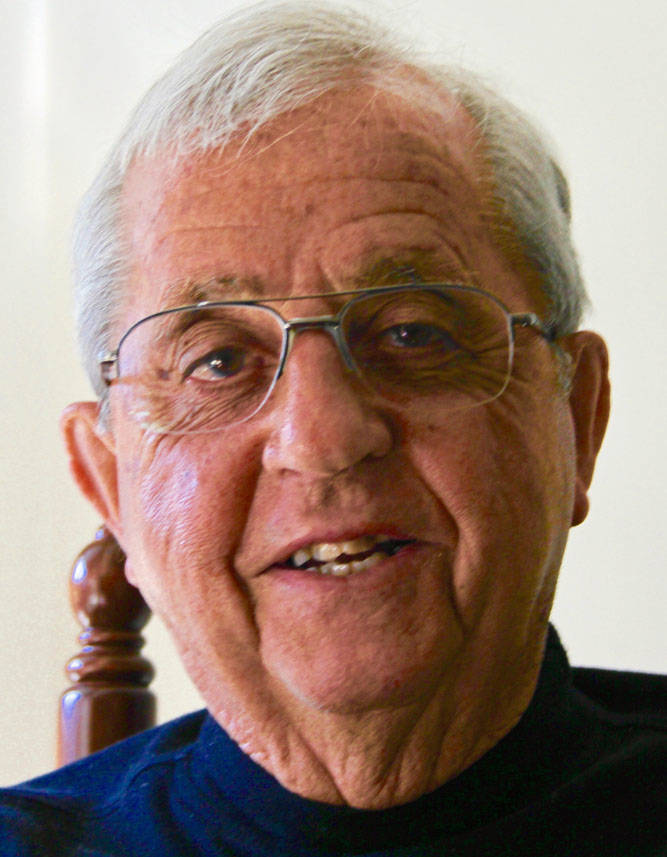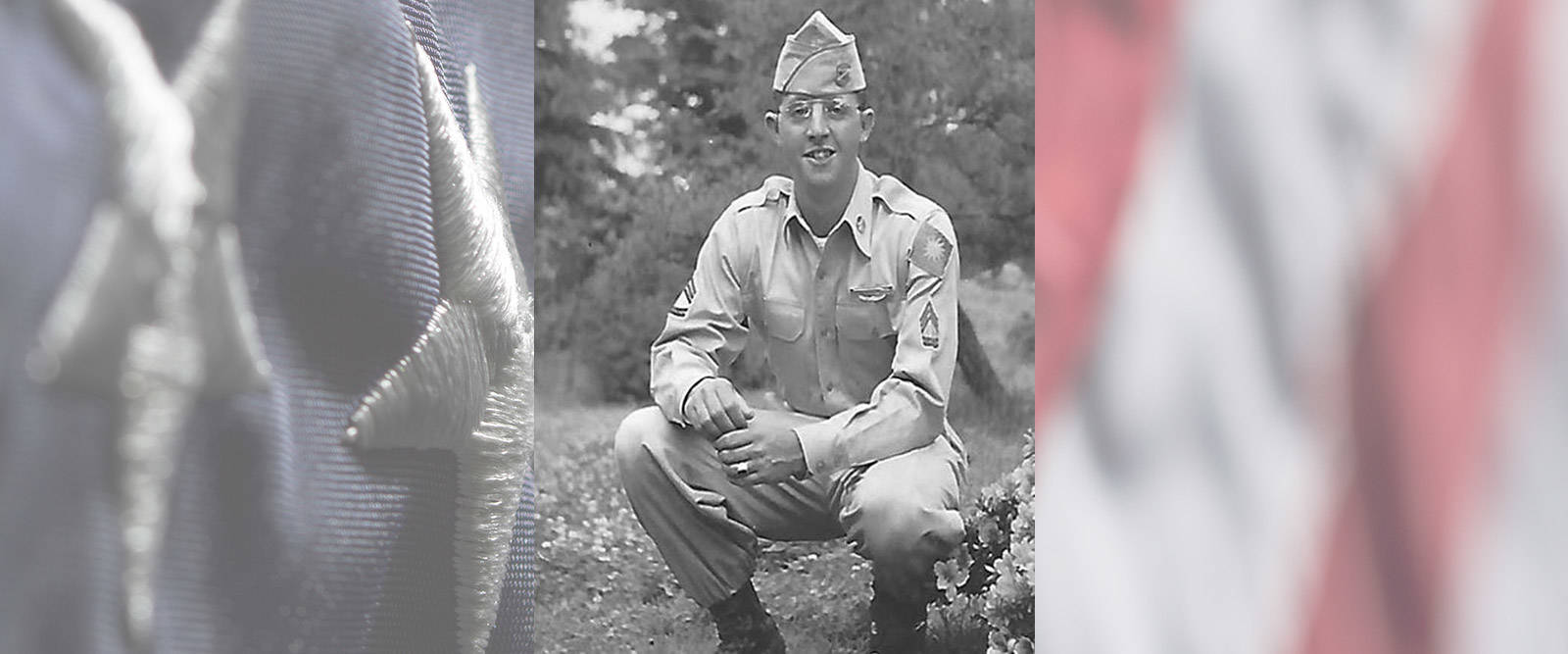U.S. Army Korean War Park Ridge, IL Flight date: 05/09/18
By David Adams, Honor Flight Chicago Veteran Interview Volunteer
William “Bill” DeCicco grew up in Chicago the youngest of 5 brothers. Three of his brothers served in World War II, one in the Navy and two in the Army. Bill’s parents had emigrated from Vasto, Italy settling in Baltimore. During the Depression, the family eventually moved to Chicago. His dad was an artist and sculptor which explains the talent he and his brothers displayed. Following his graduation from Lane Tech High School in 1946, Bill not surprisingly worked in an art studio and with an ad agency in Chicago until the draft came calling.
Bill received his draft notice in the summer of 1950, almost immediately after the invasion of South Korea by the North. He reported to Fort Leonard Wood, Missouri in mid-October just as it was being reopened after its closure in 1946. Bill remembers that “a salty old sergeant made our lives miserable” for a couple of weeks. He was then transferred to Camp Cooke in California, north of Los Angeles for Basic Training and was assigned to the 40th Infantry Division, 223rd Infantry Regiment. The 40th nicknamed the “Sunshine Division” was an Army National Guard unit based in California which had been mobilized for the Korean War.
Bill was assigned to H Company which operated heavy weapons including machine guns, mortars and Browning Automatic Rifles (BARs). His lieutenant asked him if he wanted to be a squad leader to which Bill said, “Would I have to serve on KP (Kitchen Patrol)?” Receiving an affirmative answer Bill turned down the offer. Later he was offered the same position but without KP, and Bill agreed. Training at Camp Cooke lasted until the division shipped out to Japan in January, 1951. Bill remembers the long 29 day voyage from San Francisco. While onboard ship there was not much to do except eat and sleep and maybe play cards. He did draw guard duty once. He was stationed in the very bow of the ship which kept “going up and down and up and down.”
The 40th went into more training on the island of Honshu in order to become combat ready. Bill became an expert on the 30 caliber water-cooled machine gun. His squad also had a lightweight 30 caliber weapon. Toward the end of combat readiness training in Japan, he and others were offered the chance to learn to ski. Bill thought this was a great idea and joined a large group of volunteers. His instructors were Russians. After a handful of basic lessons, the group from the 40th abandoned the idea since the division’s training was nearly complete. He had looked forward to skiing down Mt. Fuji!


By the end of 1951, the Army deemed the 40th combat ready. Orders to ship to Korea and relieve the 24th Infantry Division came in December and Bill boarded another troop transport headed for Pusan. He remembers arriving in Pusan Harbor in the middle of the night and being trucked north to the Iron Triangle area of operation on the MLR (Main Line of Resistance) near the 38th Parallel. The 40th divided its time on the line and in reserve.
Bill’s heavy weapons squad and the others from H Company provided fire support for the rifle companies. Covering fire from the machine guns and mortars made the advancement of the infantry possible. He recalls that during the winter of 1951-52 the temperature dropped to minus 30 F. He remembers his squad received a sniper rifle with a battery-operated night scope, that easily froze.
When rotated off the line and placed in reserve, he and his company rested at Wonju and lived in barracks built by the Japanese army during WWII. He remembers hot showers, clean clothes and better food. From time-to-time when a general officer made an inspection, the dining hall served steaks, a welcomed meal by all the soldiers. While on an outpost for 3 to 4 months at a time, Bill remembers that he ate almost exclusively C-rations.
As a result of his combat duty, Bill received the Army Commendation Ribbon with Metal Pendant. The citation states in pertinent part: Sergeant DeCicco “distinguished himself . . . serving as a Section Leader in a machine gun platoon, inspired his men through his distinguished leadership and courage while detailed on the outpost line of resistance in support of infantry operations. While engaged in direct fire operations against the enemy, Sergeant DeCicco displayed superior aggressiveness and initiative, though often coming under retaliatory fire as a result of these operations. The success of these missions was due in part to the unflagging devotion to duty, skill and bravery on behalf of Sergeant DeCicco.” Bill’s abiding memory from the Army was “having served my country.”
At the end of August 1952, Bill rotated back to the States and mustered out as a Master Sergeant at Fort Carson on September 25, 1952. Following his return to Chicago, he resumed working in art and advertising. His eldest brother had founded a Chicago-based commercial art and photography studio, STEPHENS, BIONDI AND DECICCO. As a result of his advertising work, he became close friends with a young Chicago Bears player, Brian Piccolo. When Brian died of cancer in 1970, Bill spearheaded the founding of The Brian Piccolo Cancer Research Fund of which Bill became president.
As an eligible bachelor, Bill drove a Triumph TR3. While lifeguarding, he met Mary Ellen, a girl from Milwaukee. Her parents were skeptical of a suitor from “gangster ridden” Chicago, so they eloped. This November they will celebrate 59 years of marriage. They have one son, a daughter and 3 grandsons.
Bill, thank you for your faithful service to our nation in Korea during the “Forgotten War.” Enjoy your well-earned trip to Washington, D.C.



